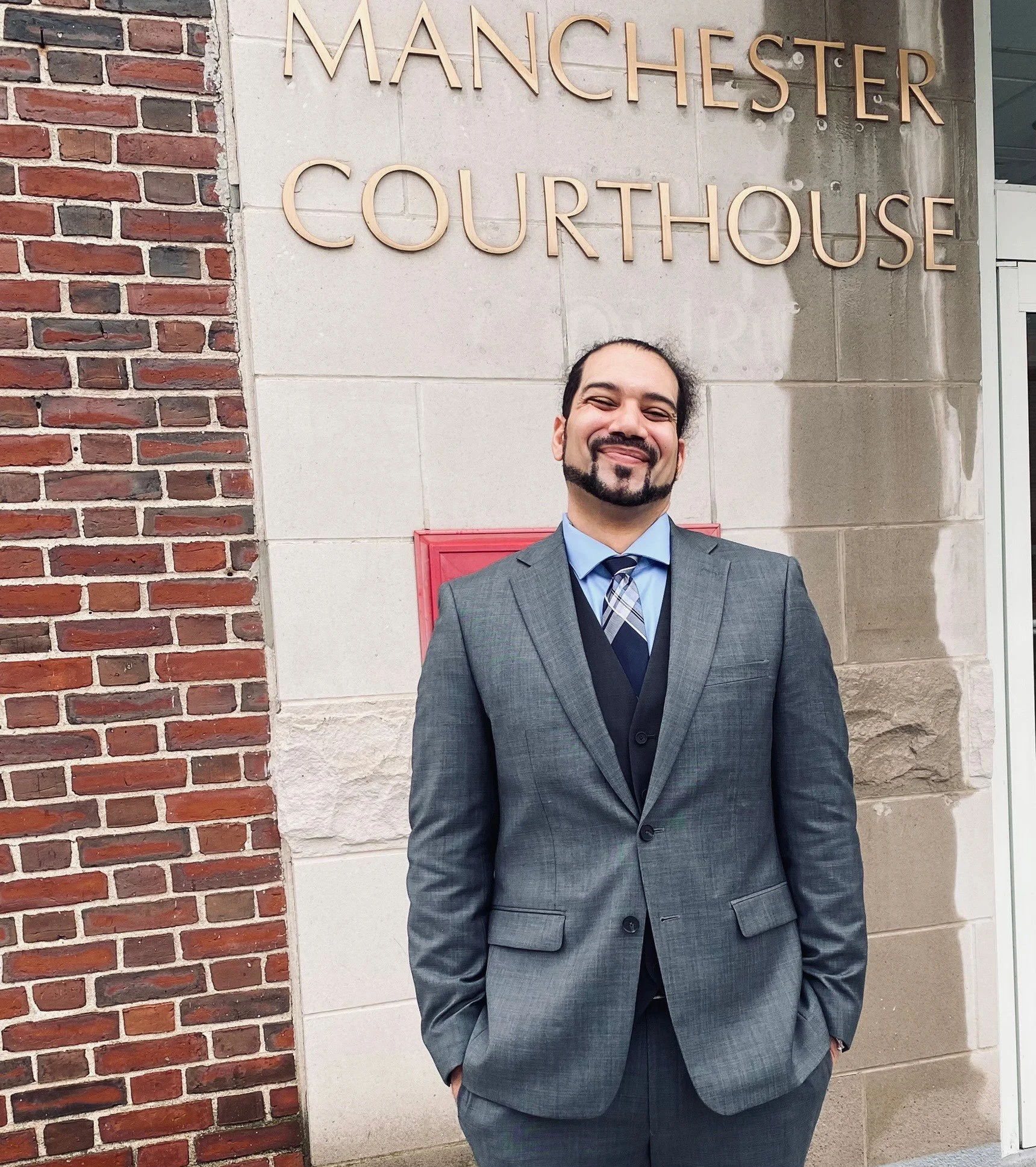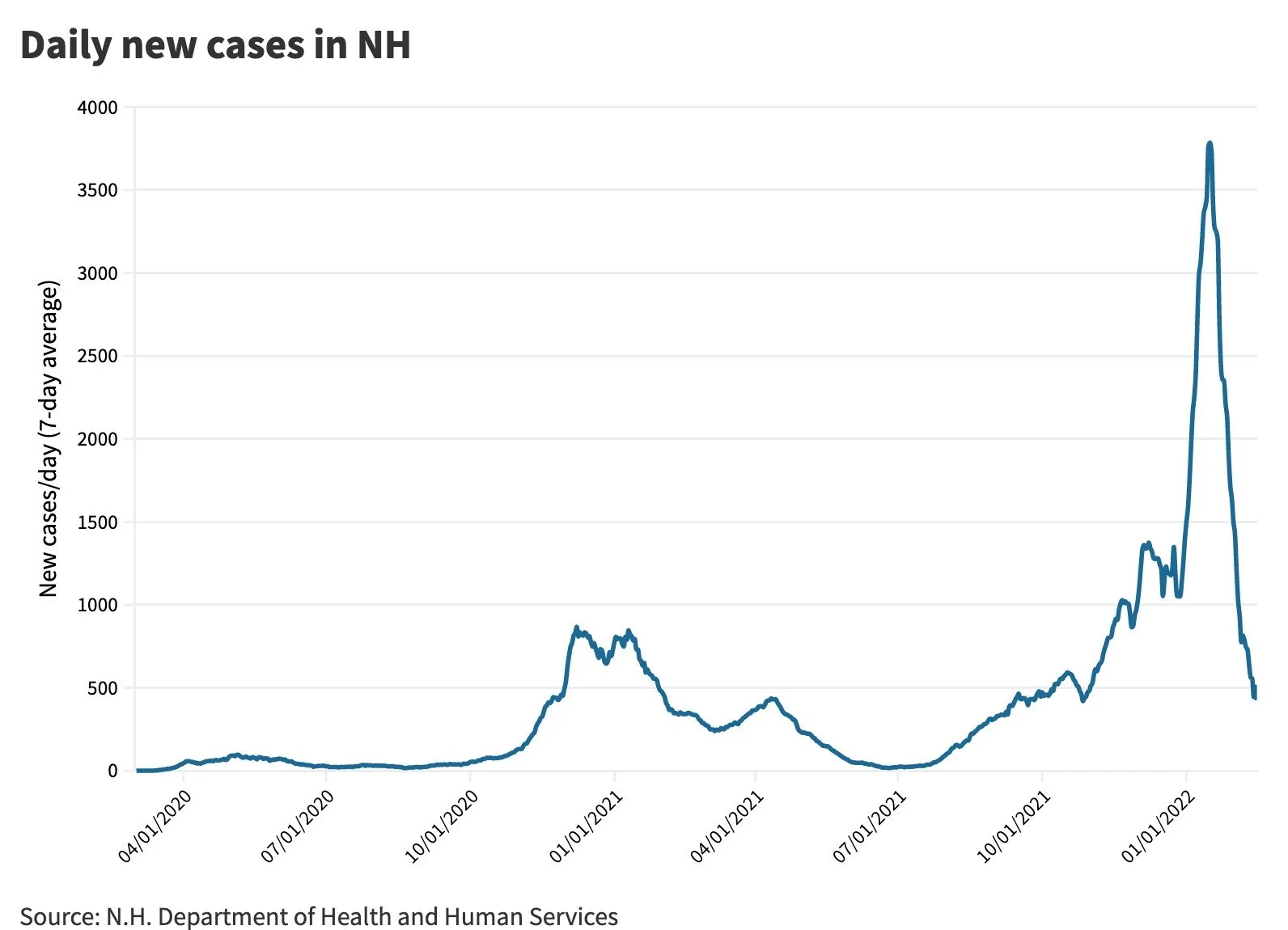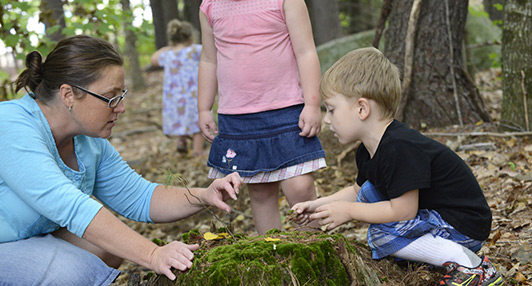Like the rest of the nation, New Hampshire is facing a home care crisis. Most adults want to age at home, but experts say the current approach to providing care outside an institution is unsustainable. Granite State News Collaborative Journalist Kelly Burch, Cornerstone VNA President and CEO Julie Reynolds, and Nurse and Caregiver Jamie Villers discuss the problem and what some people are doing to address it with The State We’re In host Melanie Plenda.
Through town meeting, Granite State voters access direct democracy
There are many ways to prepare for town meeting. Get a copy of your town’s annual report, and read up on the issues that you’ll be discussing. Grab a cushion, snacks and water — this might take a while. Then, remind yourself that you’re participating in one of the most direct forms of democracy globally.
Cases continue to drop, Nursing shortage causing strain
According to data from the state’s official COVID response dashboard, New Hampshire averaged 242 new cases per day for the week ending Tuesday, down 44 percent from a week earlier. The seven-day average for the share of antigen and PCR tests coming back positive was 7.6 percent, down from 12.8 two weeks ago. According to NH Hospital Association data as of Wednesday, a total of 211 people were hospitalized with COVID, including 95 with active infections and 116 who are COVID-recovering, which means that they are no longer infectious but still need inpatient care for COVID-related illness. The number of total hospitalizations is down from 327 two weeks ago.
State of the State
Governor Chris Sununu gave his State of the State address February 17th before a joint session of the New Hampshire House Representatives and Senate. To discuss the speech with The State We’re In host Melanie Plenda is Anna Brown, the director of research and analysis for Citizens Count, and Annmarie Timmins, senior news reporter for the New Hampshire Bulletin.
Police body-worn cams: ‘It’s just beneficial for finding out the truth of the matter’
On the night of Aug. 19, 2021, Torres, 40, was among a group of people police describe as in a near-riot state. On the pavement, covered by a tarp, was 67-year-old Beverly Avery, a Hispanic woman who was struck and killed by a motorist. (The identity of that driver still has not been released by police who only will say he is 22-years-old and from Bedford. Chief Allen D. Aldenberg said the results of the investigation are with the Hillsborough County Attorney’s Office who will decide how to proceed.)
NH COVID cases, hospitalizations continue steep drop
New COVID cases and hospitalizations in New Hampshire dropped again over the past week, as the winter surge continues to recede.
The state averaged 425 new cases per day in the week ending Tuesday, compared to 745 a week earlier — a 43 percent drop — according to data from the N.H. Department of Health and Human Services.
Home Care Workers, Agencies and Patients All Struggle
Keeping Alyssa Villers safe and healthy is a full-time job. After graduating from Emory University and working for the CDC, Alyssa was diagnosed with dementia at 31. Her condition progressed rapidly and now, at 36, she is non-verbal and requires around-the-clock monitoring. At the same time she’s still young and active, so her mother is determined to keep her out of a nursing home for as long as possible.
New System for Mental Health Crises Sees Strong Demand
Throughout January, Granite Staters in emotional and mental health crisis reached out 4,152 times to a new program designed to streamline mental health services in the state.
“It has taken us a bit by surprise. It’s a pretty heavy response,” said Eric Eason, an account executive with Beacon Health Solutions (cq), a national company that was awarded the contract for administering New Hampshire’s Rapid Response Access Point.
‘A User’s Guide to Democracy’ and why civics matters
The study of the rights and duties of citizenship - also known as civics - isn't something that gets a lot of attention in New Hampshire or across the country. Joining The State We’re In host Melanie Plenda are three people who are doing their part to change that and find fun ways to teach people about how the government and its institutions work: hosts of New Hampshire Public Radio Civics101 podcast Nick Capodice and Hannah McCarthy, as well as Martha Madson, the executive director for the New Hampshire Civics.
The State We're In - ‘A User’s Guide to Democracy’ and why civics matters
The study of the rights and duties of citizenship - also known as civics - isn't something that gets a lot of attention in New Hampshire or across the country. Joining The State We’re In host Melanie Plenda are three people who are doing their part to change that and find fun ways to teach people about how the government and its institutions work: hosts of New Hampshire Public Radio Civics101 podcast Nick Capodice and Hannah McCarthy, as well as Martha Madson, the executive director for the New Hampshire Civics.
BITCOIN—BLESSING OR DISASTER?
Cryptocurrencies are privately developed and maintained digital products for making and accepting financial payments and protecting wealth. They are intended to replace government currencies, such as the dollar-based currency provided by the U.S. Treasury. By far the most widely accepted and used cryptocurrency is Bitcoin, introduced in 2009. Millions of individuals and entities worldwide hold or have held investments in Bitcoin, and tens or hundreds of thousands of individuals and entities engage in Bitcoin “mining” (the process of creating new Bitcoin by solving computational puzzles).
America Writ Small
Eaton, New Hampshire is a place where a town official agrees to talk about a local controversy but insists on making eggplant parmesan for the occasion, where a reticent citizen who doesn’t want to be interviewed does so by “respectfully declining,” and where visitors to the Little White Church are reminded to check their politics at the door.
But it’s also a place where longtime friends have ceased speaking to one another, where name-calling attacks appear in the letters to the editor section of the local newspaper, and where a Confederate flag, a gay pride flag, a Black Lives Matter flag, a middle finger flag and other banners compete, flapping idly like the remnants of a recent war.
Missing children: NH doesn’t track pre-school kids; community has a role to play in protecting the vulnerable
With a search for 7-year-old Harmony Montgomery ongoing for weeks now, the question still being asked, but for which the answer remains elusive, is how does a child go missing for more than two years and neither police nor child protection services know about it?
“The more provocative question would be who noticed the child when she wasn’t missing,” said Moira O’Neill, Director of the New Hampshire Office of the Child Advocate, which has oversight for the state Department of Children, Youth and Families (DCYF). She is not seeking reappointment to her post which expires on Jan. 31, 2022.
COVID-19 numbers hit all-time highs
"In recent weeks, the number of new cases and hospitalizations has surged across our state and we continue to operate at or near capacity as a result," says Dr. Tom Wold, Chief Medical Officer at Portsmouth Regional Hospital.
The surge is hurting hospitals at two levels, doctors say, both increasing the burdens on their staff and reducing the number of staff available to meet the community's needs.
The State We're In - Lead Paint
As part of an ongoing series about environmental justice, the Granite State News Collaborative and NH Bar News have teamed up to look at environmental challenges facing New Hampshire families. In this series of stories, the team explores why lead paint is still a problem in New Hampshire and what’s being done to clear homes of this hazard, particularly for children living in poverty. Joining The State We’re In host Melanie Plenda this week are Scott Merrill (editor at NH Bar News), Kathie Ragsdale (reporter for the Granite State News Collaborative), John Bassett (data and research editor for the Granite State News Collaborative), and Paul Cuno-Booth (reporter for the Granite State News Collaborative).
COVID-19 cases increase, Hospitalizations remain steady
According to data from the state’s official COVID response dashboard, New Hampshire averaged 1,495 new cases per day for the week ending Tuesday, up 41 percent from 1,057 a week earlier. The seven-day average for the share of antigen and PCR tests coming back positive was 20.6 percent, up from 15.2 percent a week ago. A total of 503 people were hospitalized for the diseases as of Wednesday, including 359 people with active infections and 144 people who are no longer infectious but still need critical care. (This last type is now being referred to in state data reports as "COVID-recovering.")
COVID-19 numbers continue to drop; Hospitals under strain
According to data from the state’s official COVID response dashboard, New Hampshire averaged 992 new cases per day for the week ending Wednesday, down 14 percent from a week earlier. The seven-day average share of antigen and PCR tests coming back positive was 15.2 percent, up from 13.2 percent a week ago. 384 people were hospitalized for the disease as of Wednesday, down slightly from 399 the previous week.
The State We're In - Year in Review
From the pandemic to our economy to schools to local government, 2021 has been a challenging year. With the release of the COVID 19 vaccines at the end of 2020, many were hopeful that the worst days of the pandemic would soon be behind us, but that's not been the case. The virus continued to dominate our lives and local headlines. Sarah Gibson (Education and Demographics reporter from New Hampshire Public Radio), Nora Doyle-Burr (Health reporter from the Valley News), and Matt Mowry (Editor of Business New Hampshire Magazine) join The State We’re In host Melanie Plenda to review some of the year’s biggest stories.
NH House comes back with a bang: big bill votes in January
Every year the New Hampshire House of Representatives reconvenes the first full week of January. In non-election years, their first order of business is voting on bills kept in committee for more work over the summer and fall. This year is notable because there are several major policy changes coming out of committee. Representatives have scheduled a three-day voting marathon for these bills January 5, 6, and 7.
Pandemic makes finding child care even more difficult
A 2018 Center for American Progress analysis found that more than half of Americans live in a childcare desert. And now add a pandemic that has stretched almost two years to the scarcity of spaces and ever-rising cost, and the stress for both child care providers and those looking for a facility has increased exponentially.




















